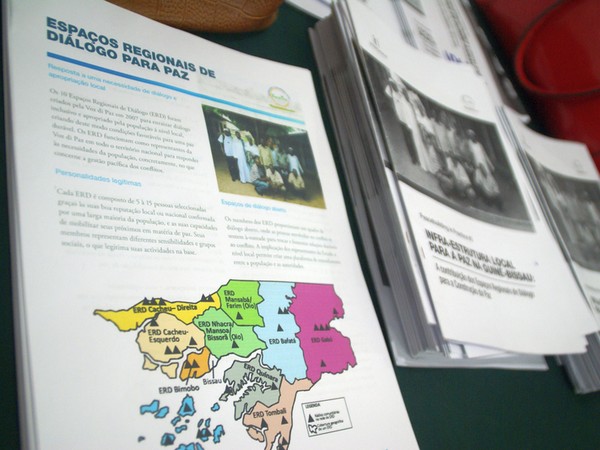A case study from Guinea-Bissau: How local spaces for dialogue contribute to peace

Few question the idea that dialogue has a role to play in creating peace. But less is known about how local dialogue spaces can contribute to longer-term peacebuilding and statebuilding processes.
In 2007, Interpeace and its partner in Guinea-Bissau, Voz di Paz set up a network of 10 “regional spaces for dialogue for peace”. These are local dialogue processes that are located ¬across the country, each made up of community leaders who facilitate open dialogue among community members and local government officials on key challenges they face in their everyday lives. Their aim is to support social cohesion and effective local governance.
The impact of this local infrastructure for peace in Guinea-Bissau is explored in a case study and a documentary film, both entitled “The Contribution of the Regional Spaces for Dialogue to Peacebuilding”.
Members of these Regional Spaces, as well as direct beneficiaries of their work, engaged in a collective reflection of how they contributed to peacebuilding and statebuilding over the course of eight years. They examined such questions as: How have they been able to ensure local ownership? Do they have any impact at the national level? How can they sustain their actions without external financial support?
Ensuring local ownership, sustainability and national impact
The case study describes how Voz di Paz trained the members of the Regional Spaces for Dialogue to undertake the mission – entrusted to them by the community – including such skills as effective network-building. The extent to which they have taken on full ownership of this role is exemplified by the following member testimony:
“This is our country, and the problem is here in our country. Instead of sitting down and waiting for the people abroad to come solve our problems, we should be the ones to solve them. When we were selected by Voz di Paz, we were not shown money. If Voz di Paz doesn’t have money, we can still keep going on but we won’t stop doing this job because it is for our country.”
Members work in synergy with local representatives of the State, such as the police, courts and the administrators. By demonstrating their complementary value, they have laid the foundation for future collaboration and impact in the long term. National impact is also achieved through the Regional Spaces’ close links to the Voz di Paz network of 31 community radio programmes, which allows them to raise awareness of peaceful conflict management among a large part of the society.
“Spaces for dialogue” in Interpeace programmes in other countries
Other examples of dialogue infrastructures put in place by Interpeace and its local partners are the Peace Houses in Timor-Leste, Spaces for Dialogue in Mali, Permanent Dialogue Groups in Burundi, and as well as the Spaces for Peace, Citizen Forums and Youth Dialogue Clubs in Rwanda.
They vary in how they are structured because they are shaped by the communities, who adapt them to their local realities.
Through Interpeace’s facilitation and support, the lessons learned from one infrastructure can feed into the work of the others – in a global exchange of experience between local peacebuilders that reinforces their work. As such, this publication is part of Interpeace’s “Peacebuilding in Practice” series, which documents good practice from its programmes in order to inspire other peacebuilders around the world.
The report and summary are available in English, French and Portuguese Cliquez ici. The documentary film is available in Portuguese with English subtitles.
